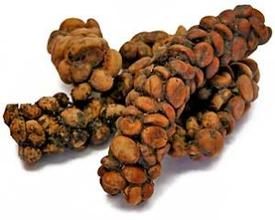The latest introduction of boutique coffee beans blue mountain coffee beans
Blue Mountain Coffee refers to coffee brewed from beans from the Blue Mountains of Jamaica. According to the grade, it is divided into Jamaica Blue Mountain Coffee and Jamaican Alpine Coffee. The Blue Mountains are located in the eastern part of the island of Jamaica, hence its name because it is surrounded by the Caribbean Sea. On clear days, the sun shines directly on the blue sea, and the peaks reflect the bright blue light of the sea. The highest peak of the Blue Mountains, which is 2256 meters above sea level, is the highest peak in the Caribbean and a famous tourist attraction. Located in the coffee belt, with fertile volcanic soil, fresh air, no pollution, humid climate, foggy and rainy all the year round (the average precipitation is 1980 mm, the temperature is around 27 degrees), this climate has created the world-famous Jamaican Blue Mountain Coffee and the second most expensive coffee in the world. This kind of coffee has the characteristics of all good coffee, not only full-bodied and mellow, but also because of the perfect combination of sweet, sour and bitter coffee, it has no bitter taste at all, only a moderate and perfect sour taste.
The "secret" of why Blue Mountain coffee tastes pure: their coffee trees are all on rugged hillsides, and the picking process is so difficult that non-local skilled women are simply unable to do it. It is very important to choose the right ripe coffee beans when picking. Immaturity or ripeness will affect the quality of the coffee. The picked coffee beans are shelled on the same day, and then let them ferment for 18 hours. After that, the coffee beans were cleaned and screened. The subsequent process is to dry, which must be carried out on the cement floor or on a thick blanket until the humidity of the coffee beans drops to 12% 14%. And then store it in a special warehouse. Take it out and roast when needed, then grind it into powder. These procedures must be strictly mastered, otherwise, the quality of coffee will be affected.

Important Notice :
前街咖啡 FrontStreet Coffee has moved to new addredd:
FrontStreet Coffee Address: 315,Donghua East Road,GuangZhou
Tel:020 38364473
- Prev

Introduction to the taste of boutique coffee beans, Indonesian Manning coffee
Anyone who has tasted Indonesia's Mantenin Coffee knows that it has a rich, solid taste and a pleasant sour taste. The smell is mellow, the acidity is moderate, the sweetness is rich and very intriguing, it is suitable for deep baking and exudes a strong aroma. The gentleman in coffee-- Sumatra Takengo Manning is a high-quality coffee bean growing in the plateau and mountain area at an altitude of 750-1500 meters.
- Next

Civet Coffee introduction to the latest Coffee introduction to Kopi Luwak
Kopi Luwak is produced by the feces of Indonesian coconut cats (a kind of civet) as raw materials, so it is called Kopi Luwak. This kind of animal mainly feeds on coffee beans. After completing fermentation in the coconut cat's stomach, it destroys proteins, produces short peptides and more free amino acids, reduces the bitterness of coffee, and then excretes feces as the main raw material. Because coffee beans cannot be digested, they will be
Related
- Detailed explanation of Jadeite planting Land in Panamanian Jadeite Manor introduction to the grading system of Jadeite competitive bidding, Red bid, Green bid and Rose Summer
- Story of Coffee planting in Brenka region of Costa Rica Stonehenge Manor anaerobic heavy honey treatment of flavor mouth
- What's on the barrel of Blue Mountain Coffee beans?
- Can American coffee also pull flowers? How to use hot American style to pull out a good-looking pattern?
- Can you make a cold extract with coffee beans? What is the right proportion for cold-extracted coffee formula?
- Indonesian PWN Gold Mandrine Coffee Origin Features Flavor How to Chong? Mandolin coffee is American.
- A brief introduction to the flavor characteristics of Brazilian yellow bourbon coffee beans
- What is the effect of different water quality on the flavor of cold-extracted coffee? What kind of water is best for brewing coffee?
- Why do you think of Rose Summer whenever you mention Panamanian coffee?
- Introduction to the characteristics of authentic blue mountain coffee bean producing areas? What is the CIB Coffee Authority in Jamaica?

